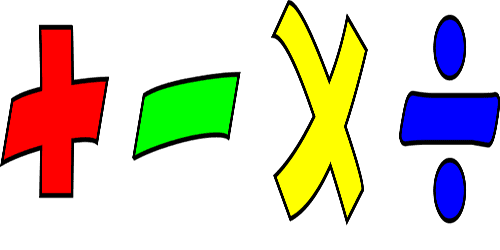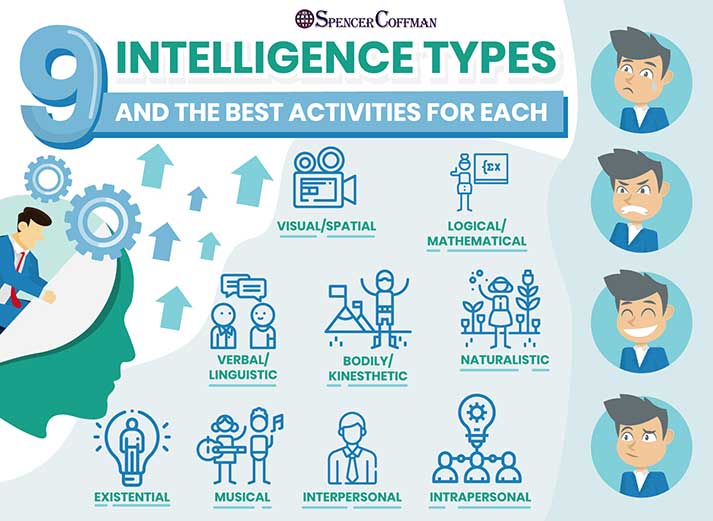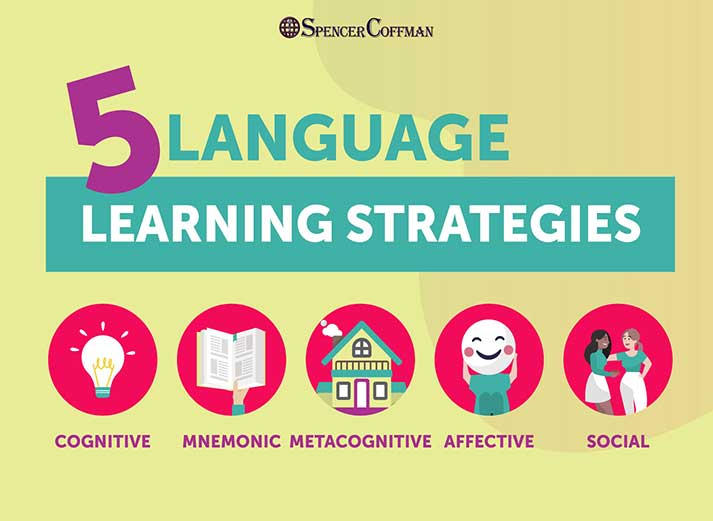Intelligence types are somewhat of a confusing topic when it comes to learning. The main thing to remember is that not everyone thinks and learns the same. Therefore, if you can identify how someone thinks and reasons then you will be able to speak in terms that he or she will understand. In doing so, they will be much more likely to learn whatever you are trying to teach them. Thus, it is important that any teacher knows and understands the 9 different intelligence types and how to engage students with each type of intelligence.
There are 9 different intelligence types that make up the Theory of Multiple Intelligences by Howard Gardner. They can also be known as learning styles. Whatever the classification, they are the general ways in which people think and learn. Of course, many individuals have a combination of these types. However, generally, one is dominant over the others. They are Visual/Spatial, Verbal/Linguistic, Logical/Mathematical, Bodily/Kinesthetic, Interpersonal, Intrapersonal, Musical, Naturalistic, and Existential.

Visual/Spatial
Visual/Spatial learners are exactly that. They are all about how the world looks around them. They see what people are saying and they’ll even say it that way as a means of telling someone they understand them. “I see what you’re saying”. They often use visual representations of things to retrieve memories by visualizing the memory in their mind. They tend to remember what things look like and what things were next to. They use landmarks and love pictures. These people may never forget a face.
Post To Multiple Facebook Groups With Ease!
When working with Visual/Spatial learners they need activities that involve visualization and organization. Anything that allows them to work with, and use, the space around them is a plus. They love to have things neat and know where things are both in the physical world around them and in visualization in their mind. Something as simple as rearranging the books on a shelf or sorting the Legos according to shape, size, or color would be perfect for these people. Of course, the classic examples of coloring, painting, or drawing are also effective.
Verbal/Linguistic
These people are all about words and how things function within a language. Of course, they may not all be grammar freaks or writers. However, they are all about talking. They may need to say things in order to remember them. In addition, they all use subvocalization when reading. This means they say the words in their minds when reading something almost as if reading it aloud to themselves. Some of these people may be very literal and like rules. They understand syntax and know how things work together to form something. They see individual parts that make a whole.
Learn How To Spot Lies And Detect Deception
People with Verbal/Linguistic intelligence need to have activities involving words and vocabulary. They tend to like spelling and enjoy arranging things so that they make sense. Games that involve spelling or trivia are perfect for them. A classic example is the game of “Memory”. Crossword puzzles and word finds are also a good choice as they involve the formation of words and recalling vocabulary.

Logical/Mathematical
People with Logical/Mathematical intelligence see the world in a logical and numerical fashion. They tend to like step-by-step progression and order. Most of them are very rational and like to solve problems. The world is their playground and they are always seeking to improve something or make things better. They see solutions to everything and give advice to those who need it. They are thinkers and enjoy entertaining thoughts and notions in their minds.
People with high Logical/Mathematical intelligence need to have activities that involve problems with step-by-step solutions. They like to work through a progression and see where it leads. Any activity involving a strategy or a formula is perfect. They need to be able to see the steps they are taking and follow them to the finish line. Games such as chess, checkers, or Chinese checkers are a great choice. In addition, any form of puzzle, riddle, or mind game would be good.
Start Investing In The Stock Market For FREE!
Bodily/Kinesthetic
Bodily/Kinesthetic people are sensory based. They feel the world around them and learn through touch. These people like to have things in their hands. They want to touch and feel it in order to understand it. These people feel what you are saying and will often say so when telling you they understand. “I feel you man”. They may wear athletic and comfortable clothing that feels good and they often speak in expressions of how things feel.
Activities for people with Bodily/Kinesthetic intelligence need to involve physical objects. Sort of like spatial people, they like to move about in the world around them. They want to engage the space in which they live. When it comes to learning they like doing things with their hands. Tasks such as putting the right shaped block into the correct slot or building with blocks or Legos are perfect. Making crafts or conducting experiments are also great choices. Pretty much anything that is a physical task will work well.

Interpersonal
Interpersonal people like to be involved with other people. They are extroverted and enjoy social interaction. These are the social butterflies and the kids the often get in trouble for speaking out of turn or not raising their hand before answering a question. They like to work with others in completing tasks and doing things. They have a lot of friends and are popular and very outgoing. These people like other people around them and may need that stimulus in order to feel like they matter or are important.
Prioritize Your Life And Start To Relax
Individuals with high Interpersonal intelligence will do best with activities that involve working together with other people. They will enjoy icebreakers and other social activities. In addition, team games like building a human pyramid or untangling the human pretzel are great for them. Basically, anything that involves social interaction with other people will help these people learn and retain information.
Intrapersonal
Intrapersonal is the opposite of interpersonal. These people are introverted and like to keep to themselves. They can interact with others and many of them do so very well. However, they don’t need social interaction. In fact, many of them prefer to work on their own. They like solo projects. You see many of these people in individualized sports such as tennis, wrestling, swimming, et cetera. They can be good at public speaking and are not all hermits. However, they prefer to be alone with their thoughts.
Activities for Intrapersonal, or introverted, individuals need to be self-projects. Anything that they can do on their own without having to rely on other people getting it done. They like to control their environment and outcome. They are secure in knowing that they will get the job done. Written reports or papers are an excellent choice. Some of these individuals can be shy and recluse-like, and in their case, individual projects are definitely best.

Musical
Musical individuals are very involved and they always have a rhythm going through their body. These people may tend to move constantly or always be humming or whistling a tune to themselves. They may or may not like to listen to music. It depends on whether they derive their musicality from within or from others. Many of them are very musically inclined and can play different instruments. They may also be very good readers and good with languages. Generally, musically intelligent people are also very high in Verbal/Linguistic intelligence.
Get Paid For Watching YouTube Videos!
Activities for people with Musical intelligence need to be more active and involved than other activities. They like to make noise and hear what they are making. They need some rhythm and movement. Tasks such as making instruments and then playing them are a great option. Something as simple as filling glasses with water and noting the different sounds would be satisfactory for many musical children. Adults need something a little more in-depth and may enjoy sound programs on the computer or conducting auditory experiments.
Naturalistic
People with Naturalistic intelligence are the outdoorsy types. They like to be immersed in nature and like natural things. Some of them may be very into earth décor and others may really be into health food diets that involve raw, whole, foods. It is possible that a lot of these people dress like nature lovers and hippies, so to speak. On the other end of the spectrum are the individuals who are the outdoor survivalists. They are the hard-core nature people who enjoy the outdoors when they are out there and then live a regular life at home.
Get Free Bitcoin If You Join Coinbase For Free!
These individuals like to be outdoors. It is as simple as that. They love the things that come from the outdoors and enjoy being apart of what goes on out there. Projects for them should include materials from nature such as leaf pressing or obtaining bark rubs on a piece of paper with crayons. They might enjoy playing sports or games outside or even something as easy as taking a walk. Many of them enjoy a challenge, as nature is always full of obstacles and surprises.

Existential
Those with Existential intelligence live within the confines of their own minds. Some of them may be very narrow-minded people and others will be the exact opposite. They love to examine things and often conduct thought experiments. They like to look at things as a whole and see how things would play out in different scenarios. These people are either very intelligent meaning they have both street and book smarts and the world is most definitely their domain. Or they are not very intelligent meaning they are only book smart in the area of thought and anything else is not going to happen.
These people like activities that involve thinking abstractly. They want to ponder ideas and discuss them. However, many of these people may never act on any of these ideas. They love to look at things from many angles and they would enjoy having discussions. In addition, creating projects from other periods in time and asking them to draw what the world would look like from outer space would also be good choices.
Conclusion
There are 9 different intelligence types that all affect how someone learns. The best way to find out how someone learns is to talk to him or her. If you know what to look for then it won’t be long until you understand exactly how that person sees the world in terms of learning. In addition, perform a variety of these activities and you’ll quickly see which students like and don’t like each type of activity. This will help you understand how they learn and think.
For more great information take a look at the supplemental content on this website and check out these great blog posts. In addition, feel free to connect with me on social media.





